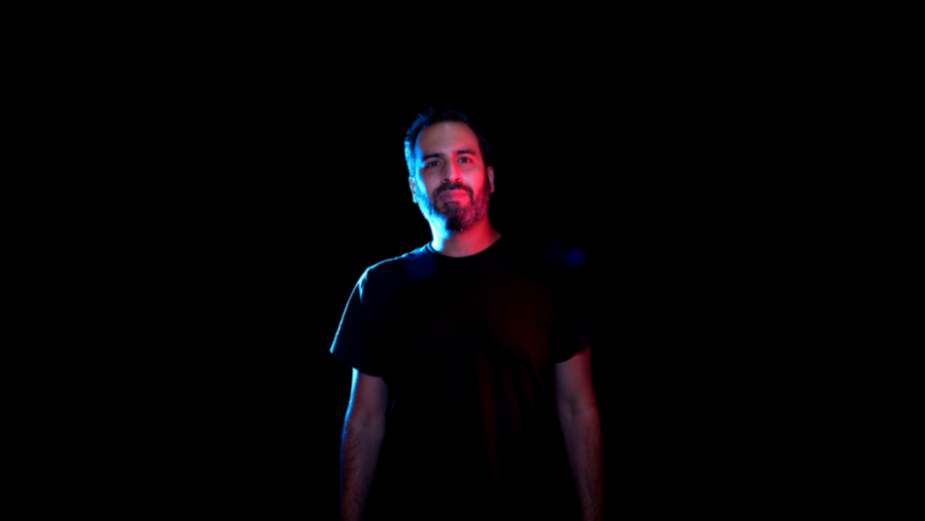
Creativity Squared: Ramzi Ibrahim on the Joy of Reasonable Deadlines

Creative director at Cheil Worldwide UAE Ramzi Ibrahim leads a creative team working across brands such as Samsung, Volkswagen, Nespresso and New Balance. He initially started in the industry as an art director, then relaunched Lebanon’s favourite beverage and even introduced credit cards to Iraq.
Prior to his involvement with Cheil, he formed Geometry Beirut, leading the creative team with a focus on brand activation and consumer engagement. Ramzi now spends his free time collecting sneakers and vinyl toys, as well as using his expertise to serve on award juries.
Person
Presentations are about putting on a show.
If you don't sound like you believe in what you're saying, if you don't seem like you're living in the idea, then you didn't have to present at all. Might as well have emailed the thing.
Is the impact of a presentation deck on a viewer the same whether they just read it on their own or viewed it through a dull presenter's narration? Probably depends on how dull it was.
I'm not much of a small talker, and I'd rather avoid unknown groups of people (that's where small talk blossoms). But once I have a persona in mind of whom I'm supposed to be for the moment in front of new people, I can talk my way through it.
That persona comes from what I'm presenting and the idea behind it. I guess I'm an introvert, keeping myself to myself unless it's with people close to me. Otherwise, little personas help me get through and sell ideas.
Product
Context always plays a key part in judging creative work, but nothing takes away from the concept.
There is some older iconic work that lacked design and art direction craft, but in most cases, it's the copy that made them great. Nowadays, visual craft is king. Sometimes it even tips some otherwise mediocre ideas over the line to semi-greatness.
There is work that I'm proud of being a part of, being recognized for, having a line from them (written by kickass copywriters) becomes part of the vernacular, and for being effective. But they're not the first things that I remember when I think of past work.
The ones that I do remember vividly are the ones that got done through sudden complications. Like a shoot where the cast could no longer make it through because of sudden security cordons of neighbourhoods, and suddenly we’re recasting 15 minutes before scenes from that single neighbourhood that we're in. Whether they were experienced or not, we had to find people who fit the roles, meet new characters, and just try to have enough lemonade from this unwanted lemon. I remember those types of projects and the great people who made them work.
Process
Letting go of an idea or the process of expanding on an idea can be hard. But being everywhere at once isn't really an option. There's a need to trust that the people whom you have with you can carry ideas to where you didn't even expect, challenge your ideas, build on them and even discard them when there's a good reason.
So which brief will be the one to step back from, and which will be the one to be more involved in?
Is it the simpler one with low risk?
How's the mental state of the team involved?
What type of client is it?
Will the client servicing make the team's life difficult or is it someone who's ‘part of the team’?
I'm not a big social creature, but I'm able to sense and predict where people are at, how they're handling things, who might need more involvement and who'd need more space to grow and develop ideas. That also plays a role in which projects I'd be deeply involved in throughout the day, and which ones I'd step into for scheduled pin-ups/pit-stops, for review and feedback.
In most cases of new campaign briefs, there'd be a session where myself and the teams' leads would discuss the project and bounce initial thoughts around. Working on your own isn't a great idea. Having too many people involved can also be too chaotic and difficult. The worst is when there are more people giving feedback than there are people working on the project.
Press
It's always good to have a deadline... A reasonable one. Having an open-ended timeframe removes the urgency and the importance of the work because the brief either keeps on evolving or you never know when to stop. Having an unreasonable deadline is just a sign of a mess-up somewhere.
I've managed to lead through stressful situations by deconstructing what's feasible in different cases and once you do that, the stress mostly goes away for the team involved. It becomes a realistic process of what's doable, and challenging the ideas within that timeframe.
I'm not sure if I ever stressed easily as a kid. I don't remember school exams stressing me out, or me taking them too seriously. I just assumed that I'll be fine and treated each one realistically as to what's doable and what's not. In most cases, I ended up doing pretty well. I guess that carried through to this day.
Growing up in different countries, travelling regularly since I was very young, reading more advanced literary works at a young age, visiting archaeological sites and museums, and watching a lot of old and new movies did expose to me a lot of different stories, storytelling and creativity that pushed me into design and communications.
I've always gravitated towards people who've had similar wide cultural and artistic experiences. I love to and always prefer to have people who've been exposed to different cultures and stories in my team. People who love to experiment with different medium(s) and listen to new things, with no judgement.
The worst type of character you can have in a team is someone who'd frequently say "I'm not supposed to", and wouldn't take that extra step to help out a teammate when they have the time to. The second worst type of person to have on a team is someone who doesn't understand typography. Once that first stretching of a typeface happens, know that our relationship will never be the same again.













